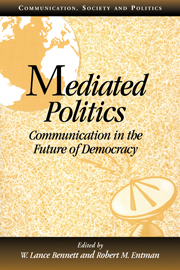Book contents
- Frontmatter
- Contents
- List of Figures
- List of Tables
- Contributors
- Preface
- Acknowledgments
- 1 Mediated Politics: An Introduction
- Part 1 Democracy and the Public Sphere
- Part 2 Citizens, Consumers, and Media in Transition
- Part 3 Mediated Political Information and Public Opinion
- Part 4 Mediated Campaigns
- 15 Issue Advocacy in a Changing Discourse Environment
- 16 Implications of Rival Visions of Electoral Campaigns
- 17 Mediated Electoral Democracy: Campaigns, Incentives, and Reform
- 18 “Americanization” Reconsidered: U.K.–U.S. Campaign Communication Comparisons Across Time
- Part 5 Citizens: Present and Future
- Index
18 - “Americanization” Reconsidered: U.K.–U.S. Campaign Communication Comparisons Across Time
Published online by Cambridge University Press: 05 June 2012
- Frontmatter
- Contents
- List of Figures
- List of Tables
- Contributors
- Preface
- Acknowledgments
- 1 Mediated Politics: An Introduction
- Part 1 Democracy and the Public Sphere
- Part 2 Citizens, Consumers, and Media in Transition
- Part 3 Mediated Political Information and Public Opinion
- Part 4 Mediated Campaigns
- 15 Issue Advocacy in a Changing Discourse Environment
- 16 Implications of Rival Visions of Electoral Campaigns
- 17 Mediated Electoral Democracy: Campaigns, Incentives, and Reform
- 18 “Americanization” Reconsidered: U.K.–U.S. Campaign Communication Comparisons Across Time
- Part 5 Citizens: Present and Future
- Index
Summary
The notions of “globalization” and its junior brother “Americanization” have become one of the mantras of the end of the millennium. They are invoked in discussion of the global economy, global culture, indeed the “globalization of everything” including, of course, the globalization of the media. The terms are used, by now, with an almost aken-for-granted air, although they have occasionally been subjected to scrutiny and criticism (Negrine and Papathanassopoulos 1996; Scammell 1998). Their compelling power, however, has not diminished.
Discussions of the processes of globalization and Americanization can be regarded as direct descendants of comparative analysis, inasmuch as the comparative approach casts a cross-cultural, cross-national net and seeks to identify similarities as well as differences among the dominant features of economic or cultural or, in our case, media systems in different societies. The logic of the comparative approach has featured quite prominently in our work in the past, and it is not surprising, therefore, that it has led us to reconsider the notion of Americanization in the present chapter.
Its point of departure is an analysis of political party and mass media roles in the U.K. and U.S. elections of 1983 and 1984, which we conducted, with colleagues, a decade ago (Semetko et al., 1991). Many differences and sources of difference were discovered – albeit allied to a suggestion that they might lessen or disappear in time. This chapter revisits our 1980s portrait of two quite contrasted political communication systems through the lens of what is known about media performance in the U.S. presidential (1996) and U.K. general (1997) elections.
- Type
- Chapter
- Information
- Mediated PoliticsCommunication in the Future of Democracy, pp. 380 - 404Publisher: Cambridge University PressPrint publication year: 2000
- 15
- Cited by



